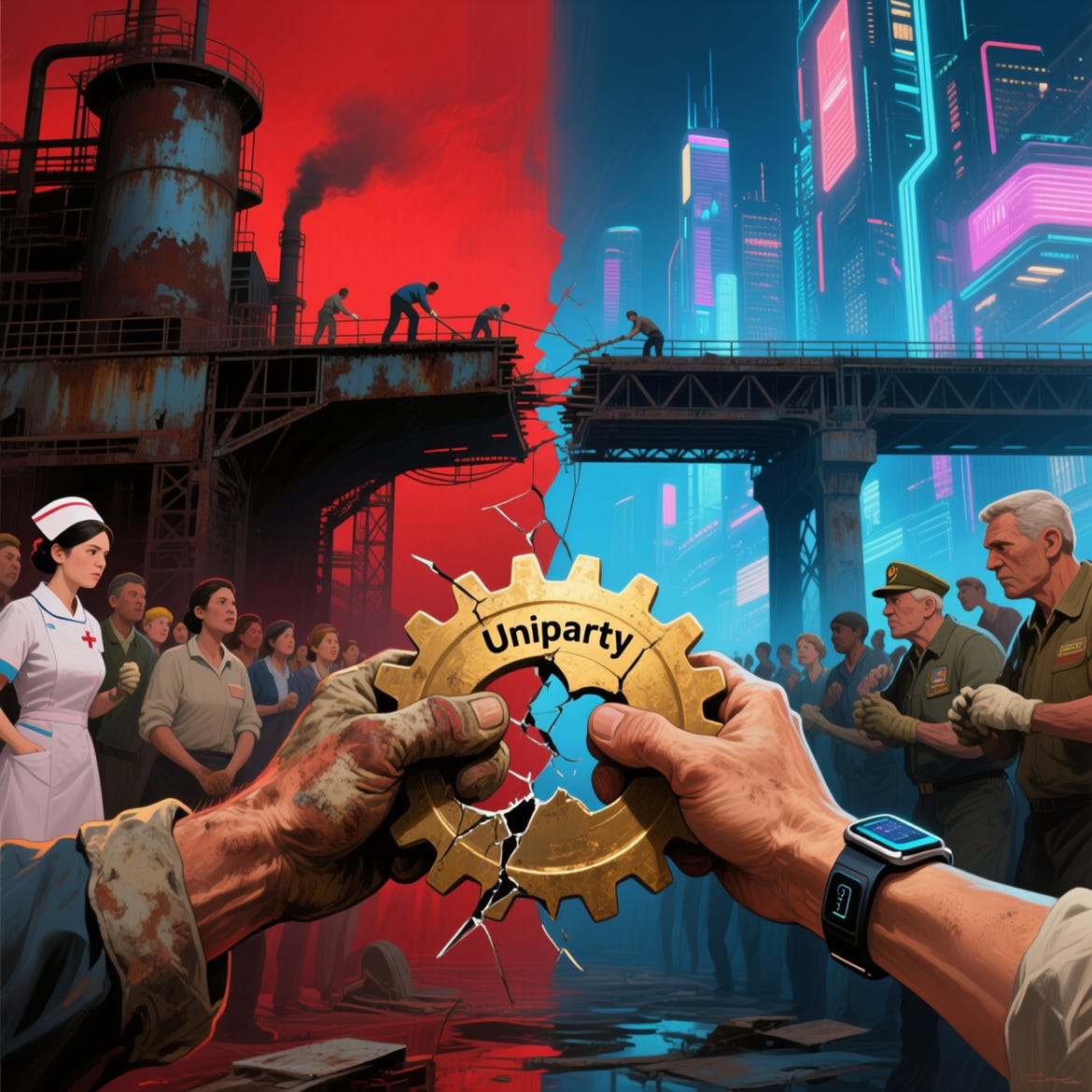What Comes After the Uniparty?
A call for post-partisan populist realignment — beyond GOP vs. Dems.
Picture this: A factory worker in Ohio and a tech freelancer in Austin both stare at their ballots during the last election. They don’t know each other, but they’re thinking the same thing: “None of these people represent me.” The worker hasn’t seen a raise in a decade, despite record profits for the company. The freelancer’s health insurance costs more than her rent. Both parties promise change, but year after year, nothing shifts. The same donors fund the campaigns. The same faces rotate through power. The real debate isn’t Left vs. Right—it’s Everyone Else vs. A Machine that’s stopped listening.
So what happens when the machine breaks?
The Two-Party Illusion (And Why It’s Failing)
Let’s cut through the noise. Republicans and Democrats aren’t enemies. They’re business partners. Think about it: When’s the last time a major bill didn’t pass without bipartisan support? Corporate tax breaks, military spending, surveillance laws—the votes are usually lopsided in favor, no matter who’s “in charge.” Red or blue, the outcomes for ordinary people stay eerily similar. Wages stagnate. Housing gets pricier. Wars drag on.
Why? Because the system rewards loyalty to the machine, not to voters. Politicians chase donor cash and media attention, not solutions. The result? A “Uniparty” — a fused power structure that pretends to fight while quietly splitting the spoils. But here’s the twist: Cracks are showing. Polls show trust in both parties is crumbling. Voter turnout? Apathy is the new majority.
The Silent Majority Isn’t Silent Anymore
For years, pundits claimed America was split 50-50 between the two teams. What they missed was the 45% in the middle—the nurses, teachers, tradespeople, and small-business owners who don’t see their lives in party slogans. These folks aren’t “moderates.” They’re post-partisan. They want healthcare that doesn’t bankrupt them, neighborhoods safe from crime and overpolicing, and jobs that don’t require a side hustle.
Social media’s exposing this shift. Viral movements don’t fit cleanly into Left or Right: parents fighting school bureaucracies, farmers blocking land grabs by megacorps, veterans demanding better care. These are single-issue voters on steroids, rallying around shared pain, not party labels.
Technology: The Great Equalizer
The 2020s aren’t the 1990s. You don’t need a political machine to build a movement anymore. Crowdfunding lets candidates bypass donor elites. Podcasts and streaming platforms drown out legacy media gatekeepers. Even local governments are using apps to let residents vote directly on zoning laws or budget priorities.
This isn’t about “disrupting” politics. It’s about rewiring it. Imagine a future where:
Town halls happen in Discord servers.
Ballot measures get drafted via TikTok collaborations.
Representatives are held accountable through real-time transparency apps (think Venmo, but for tracking lobbyist meetings).
The tools exist. The old guard just hopes you won’t use them.
Local Tribes, National Impact
Forget senators and governors. The real action is in school boards, city councils, and sheriff elections. These roles control daily life—what’s taught in schools, how police operate, which roads get fixed—and they’re easier to sway with grassroots energy.
Look at what’s happening in Tennessee. Parents and teachers teamed up to oust education officials pushing shady contracts with tech companies. In Arizona, a coalition of libertarians and environmentalists blocked a foreign mining conglomerate from draining groundwater. These groups don’t agree on everything, but they shared a common enemy: outsiders profiting at their expense.
The New Playbook for Leadership
What does a post-Uniparty leader look like? Not a career politician. Not an activist with a podcast. Think local heroes with national networks. A diner owner who organized meal deliveries during a flood. A mechanic who unionized his shop without Washington’s help. A stay-at-home mom who hacked the zoning code to build a community garden.
Credibility comes from action, not endorsements. Transparency is nonnegotiable. No more backroom deals—every meeting, every dollar, every vote gets streamed. And term limits? Two to four years, max. No one stays long enough to become the thing they swore to replace.
Building Unlikely Alliances
The left-right divide is a trap. Real change happens when opposites unite over shared goals. Farmers and climate activists? Both want clean water and stable land. Tech workers and privacy advocates? Both hate censorship and corporate snooping. Even unions and small businesses can agree on breaking monopolies.
This isn’t kumbaya idealism. It’s strategy. The Uniparty thrives on division. Ruin their game by finding common ground they can’t exploit.
Your Move
No one’s coming to save you. Not a billionaire. Not a third party. Not a protest vote. The fix starts at your kitchen table. Talk to the coworker who votes the “other way.” Start a group chat about that pothole everyone’s complaining about. Run for water commissioner.
The Uniparty’s greatest fear isn’t losing an election—it’s becoming irrelevant. And that’s exactly the goal.
—
Final Thought: Systems don’t change until the pain of staying the same outweighs the fear of what’s next. We’re close. The ball’s in your court. What’s your play?




